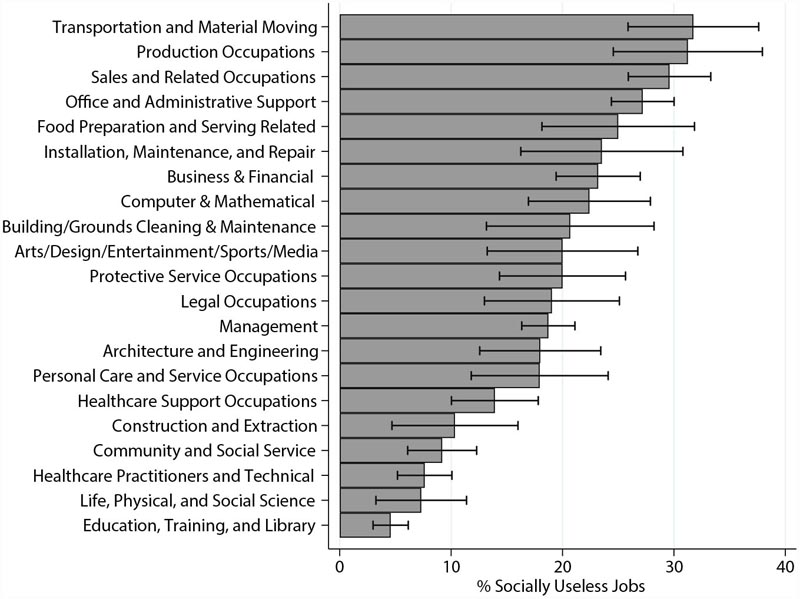Why people consider their jobs to be socially useless Summary Recent studies show that many workers consider their work to be socially useless. Therefore, several explanations have been proposed for this phenomenon. David Graeber’s ’bullshit job theory’ , for example, claims that some jobs are in fact objectively useless , and that these are found more frequently in certain occupations than others. Quantitative research on Europe, however, finds little support for Graeber’s theory and argues that alienation may be better suited to explain why people consider their jobs to be socially useless. This study extends previous analyzes by drawing on a rich and underutilized data set and provides new evidence specifically for the United States. Contrary to previous studies, he finds strong support for Graeber’s theory of bullshit jobs . At the same time, it also confirms existing evidence on the effects of several other factors, including alienation. Work perceived as socially useless is therefore a multifaceted issue that needs to be approached from different angles. |
 Figure 1 . Percentage of socially useless jobs by occupation. Data presented as two-digit Standard Occupational Classification (SOC) with standard errors. Source: American Working Conditions Survey (AWCS), 2015 (n = 1,811).
Figure 1 . Percentage of socially useless jobs by occupation. Data presented as two-digit Standard Occupational Classification (SOC) with standard errors. Source: American Working Conditions Survey (AWCS), 2015 (n = 1,811).
Comments
The theory that many people feel that the work they do is meaningless because their jobs are "bullshit" has been confirmed by a new study.
The research found that people who work in finance, sales and management roles are much more likely than others on average to think their jobs are useless to others.
The study, conducted by Simon Walo of the University of Zurich, Switzerland, is the first to provide quantitative support for a theory put forward by American anthropologist David Graeber in 2018 that many jobs were " bullshit" , socially useless and meaningless.
Researchers have since suggested that the reason people felt their jobs were useless was solely because they were routine and lacked autonomy or good management rather than something intrinsic to their work, but Walo found this was only part of the job. of history.
It analyzed survey data from 1,811 respondents in the U.S. working in 21 types of jobs, who were asked whether their work gave them "a sense of having a positive impact on the community and society" and "the feeling to do useful work.
The American Working Conditions Survey, conducted in 2015, found that 19% of respondents answered "never" or "rarely" to questions about whether they had "a feeling of having a positive impact on the community and society." and "doing useful work" spread across a variety of occupations.
Mr. Walo adjusted the raw data to compare workers with the same degree of routine work, job autonomy, and quality of management, and found that in occupations that Graeber considered useless , the nature of the work still had a large effect beyond these factors.
Those who worked in business, finance and sales were more than twice as likely to say their jobs were socially useless than others. Managers were 1.9 times more likely to say this and office assistants 1.6 times more likely.
David Graeber’s " Bullshit Job Theory " asserts that some jobs are in fact objectively useless, and that these are more often found in certain occupations than others," says the study, published in the journal Work, Employment and Society. .
"Graeber struck a raw nerve with his statement. His original article quickly became so popular that within weeks it was translated into more than a dozen languages and reprinted in newspapers around the world.
"However, the original evidence presented by Graeber was primarily qualitative , making it difficult to assess the magnitude of the problem.
"This study extends previous analyzes by drawing on a rich and underused data set and provides new evidence. "It finds that working in one of the occupations highlighted by Graeber significantly increases the likelihood that workers perceive their jobs as socially useless, in comparison with all the others. "Therefore, this paper is the first to find quantitative evidence supporting Graeber’s argument."
Law was the only occupation cited by Graeber as useless where Mr. Walo found no statistically significant evidence that staff found their jobs meaningless. Mr. Walo also found that the proportion of workers who consider their jobs to be socially useless is higher in the private sector than in the public or nonprofit sector.
| Final message : Work is recognized not only as a necessary economic activity that produces goods and provides income to people, but also as a way of contributing to society that in itself can be deeply meaningful to people. Such a perspective clearly deserves more attention. |
Reference : Simon Walo, "Bullshit" After All? Why People Consider Their Jobs Socially Useless, Work, Employment and Society (2023). DOI: 10.1177/09500170231175771 Journal information: Work, Employment and Society















